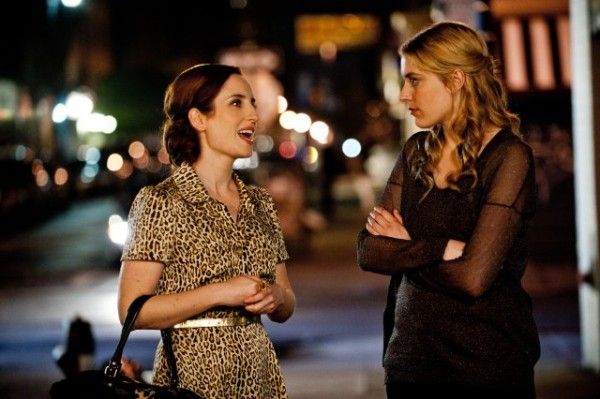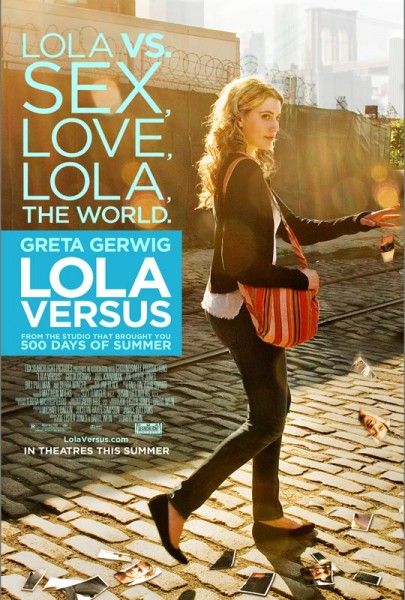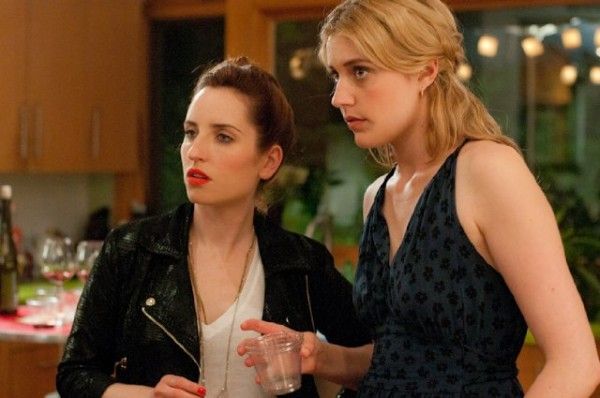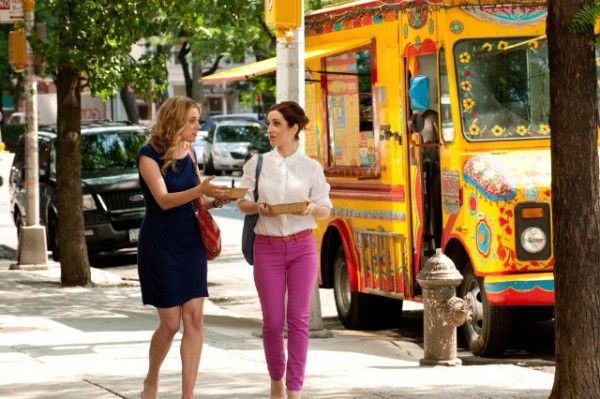Lola Versus is a comedic tale of love and loss among restless and ambitious young New Yorkers. An original new comedy from the creative team of Daryl Wein and Zoe Lister-Jones, the film is a perceptive and sometimes uncomfortably close look at the absurdities of modern romance. Lister-Jones, who co-wrote the film’s script with Wein, plays Lola’s loyal best friend, Alice, whom Lola turns to for advice as her well-ordered world dissolves into a blur of romantic humiliations, professional blunders and alcohol-fueled antics.
At the press day for Lola Versus, we sat down at a roundtable interview with Lister-Jones to talk about her collaboration with Wein that was inspired in part by their experiences as a real-life couple in an open relationship. She told us why she found the role fun to play, how being able to both act and write has empowered her creatively, how her mother encouraged her to follow her heart and study acting despite the financial insecurities, how she’d like to direct in the future, and why she thinks emotional attachment and commitment are different between men and women. She also explained why she admires actress Meryl Streep and revealed her next creative project with Wein titled Motherfucker.
Question: This is a fun role for you. Did you do any tweaking to Alice once you knew that you were going to play her?
ZOE LISTER-JONES: No. It’s always fun to play characters that are different from me so I was excited to jump into that role. It was really fun to play with broad comedy in the sort of brashness of a character like Alice. We didn’t really tweak it.
It’s a likeable brashness and you pull it off so well. Is there anyone you modeled the character on?
LISTER-JONES: Thanks. I have some girlfriends that are sort of Alice-like, but not to a “T.” I think all our characters are an amalgam of people we know in our world and ourselves.
I know it wasn’t completely autobiographical, but how much of you is there in Lola?
LISTER-JONES: I think there’s some of me in Lola for sure. Daryl and I were in an open relationship as a couple. After that we wrote a movie that was loosely based on that experience called Breaking Upwards. When we were discussing our very different experiences in the writing process, it became clear that being a single woman in New York was very different than being a single man and the landscape is a little bleaker and you’re forced to encounter a variety of sordid characters in the dating scene which seemed ripe for a comedy. But yes, we drew upon some of my experiences during that year as a somewhat single woman.
Can you talk about how you collaborated with Daryl and what that process was like?
LISTER-JONES: We come up with idea together for scripts that excite us, and if a script doesn’t excite both of us, we won’t embark on it. And then, whenever each of us feels inspired, we’ll write a scene. It’s a really organic, loose process. We don’t outline. We don’t really like to know where the story is going. I think we always knew that we wanted Lola to end up alone and be happy that way for now, that it would end on a note of hope, but it wouldn’t be the standard romantic comedy happy ending, and that you’re ultimately rooting for our female protagonist not to be with a man which we felt was important.
To play an actress who is Off-Off-Off-Broadway, do you try not to fall into the typical stereotype?
LISTER-JONES: Poor Off-Off-Off-Broadway actresses. I hope that’s not how they all are. Most actors and actresses are performative as people. It goes part and parcel with the profession and New York actors who are out of work, or actors anywhere out of work, are manic because you never know when the next job is going to come. I think Alice, also being single and searching for the right man, is just being rejected in every aspect of her life.
It seems like actors are always experimenting and that appeals to them.
LISTER-JONES: I guess actors are very sensitive people. We’re porous. That’s why we’re actors and so it’s fun to escape that reality.
Is it a choice or a relief or were you always motivated to do both the acting and the writing? Is it empowering at this stage in your career to know that you don’t have to rely on the acting?
LISTER-JONES: It’s really empowering. I’ve always been a writer, and in high school, I was the editor of my school newspaper and I got a writing scholarship. It’s always been a passion of mine. I had a hard time committing to a conservatory acting program in college because I didn’t want to sacrifice my passion for writing. And so, it’s really exciting that I get to do both and that they get to intersect. But yeah, it’s really empowering because as an actor, like I said, you never know when your next job is. Writing becomes a really good creative outlet when you’re sitting there and feeling creatively frustrated or stilted, but also you then get to write parts for yourself.
Did you go to school at Tisch?
LISTER-JONES: I did go to Tisch. I got a merit scholarship there. But, in high school, I got a grant for a short story I wrote. I always loved writing as a tool of expression.
You didn’t come from a privileged background?
LISTER-JONES: No, my parents were both artists in New York, but artists who couldn’t support themselves by their art. My mom’s a teacher and my dad has had various jobs in the magazine industry and now works in cancer research. But, I mean, I was never shielded from the realities of what it meant to be an artist and that made me afraid to be an artist because I wanted to know that my life was secure. I grew up in a financially insecure place because I knew that my parents were following their dreams which has pros and cons. It was actually my mom who encouraged me to go to acting school because I was really afraid to put all my eggs in that basket. But she said to do it because I loved it. I was thinking more practically and not really listening to my heart.
What about that scene where your character is acting in a silent play but she has no dialogue, and then afterwards, she asks Lola if she was okay?
LISTER-JONES: You always have to lie. I’ve been on both sides of it. I’ve been in plays that people don’t enjoy and I pray that they lie to my face when I come outside. And then, I’ve been an audience member for friends in plays that I don’t enjoy and I have to lie to their faces. It’s just part of that lifestyle unfortunately, especially in New York. In L.A. too, there’s a theater scene. Actors take what they can get, so if Alice is going to be a peasant in an experimental silent play, she’s going to be a peasant.
Do you see yourself ever stepping into the director’s chair or are you going to leave that to Daryl?
LISTER-JONES: I think it would be fun. I would like to at some point. For right now, I have enough on my plate at the moment, but it would be fun.
How is it different for men and women? Does it seem to you that women need emotional attachment and commitment more than men?
LISTER-JONES: I think generally, but I wouldn’t speak for all women. There are certain women who are sexually driven and they can compartmentalize it from an emotional attachment. For the most part, for me and my friends, yeah, there’s always an emotional attachment that clouds women’s judgment. That’s what we wanted to deal with. For men, they can compartmentalize physical attraction in a very different way where it doesn’t necessarily mean that they are in love with that person. Chemically, from what I have researched, and we deal with it in the movie, the dopamine that is released when they orgasm is the same as when they give birth. There are emotional ties to family that are connected to the sexual experience for women that are very different than men which does make it harder for women to date and not get hurt.
Shoes play a very big part in this film metaphorically speaking. Whose idea was it to incorporate the shoes and what do they represent to you in this film?
LISTER-JONES: We liked the idea in the beginning of this metaphorical clutter on the beach that’s in her subconscious, in her dream state. There’s the archetypal mental clutter of many women which is the shoes representing self image, and the vibrators representing sexuality, and the Chinese representing food. That’s why the shoes were there, but they then morphed into this quest for finding the right shoe in that Cinderella story that she’s on. It becomes subverted by the end, that she realizes it’s not about finding the perfect shoe, and that’s what we were ultimately going for, that it’s not a Cinderella story.
And how many shoes do you have?
LISTER-JONES: I like shoes a lot. I come from a long line of women who like shoes to a fault.
Whatever number you have, we won’t judge you.
LISTER-JONES: I don’t think I even counted.
Food plays a part in this film as a comfort. Can you talk about your views on food and its role in this film?
LISTER-JONES: For me, what we wanted to deal with in this film, and obviously it comes from some of my experience, is that food is a very intense thing for a lot of women, especially actresses where it becomes the thing that you want but can’t have. I think a lot of women, in the way that they might attach emotion to sex, attach emotion to food, in a different way than men. A lot of men attach emotion to food. In terms of the emotional eating in the film, we wanted to include that as a big part of someone’s journey after a break-up. A woman is turning to food, but because Lola’s character is raised in a New Age household, the things she turns to are rice chips, not your classic fried fare, and Kombucha. That does come from me because I was also raised in a really healthy household. My mom found me when I was 3 eating a straight stick of butter out of the fridge because I was so deprived. I was just eating whole grains and macrobiotic things. My mom’s a great cook but I wasn’t really allowed a lot of sugar or junk. That has served me well in my life. Sometimes I think that kids who are given junk food then don’t crave it as adults in the same way. I don’t know. I’m trying to figure out what the psychology is behind it before I have children.
What’s your thing now?
LISTER-JONES: I’m everything free. I’m gluten-free. I’m dairy-free. I’m sugar-free. Sometimes I’m yeast-free which really means I eat paper.
You’ve got a really great on-screen chemistry with Hamish. How did you two go about establishing your relationship?
LISTER-JONES: I just love Hamish. When you see good chemistry, most of the time it’s because those people actually like each other. It was important to us in casting this film that people really felt like they could be friends or lovers and that they would have similar qualities that would draw them to one another. Hamish is a really lovable, sweet, intelligent, sensitive guy. As writers and filmmakers, we’re drawn to that sort of leading man who’s not necessarily a hunk. We’re drawn to more sensitive men because it makes things more complicated. It makes the gender divide a little more interesting because everyone’s grappling with the same emotional issues.
You said you had an open relationship. Did that not work and now you’re in an exclusive, committed relationship?
LISTER-JONES: We are. We’re exclusive now. I think it worked at the time for what we wanted, but it’s really hard to sustain. I mean, it’s something that we are constantly exploring, both in our work and in our life, is what monogamy means and the struggles that monogamous couples face. A lot of people that we’ve talked to believe monogamy is just as difficult as non-monogamy because it just depends on what you’re willing to sacrifice and what you’re looking to prioritize. But I felt non-monogamy was really hard. When we entered into the open relationship, ultimately we thought we were going to break up so that makes it easier. It was more like ripping a band-aid off slowly. Now we live together. We own an apartment together. I think things change. But it is something that we always discuss because I do think it’s important to be honest about your feelings in a long term relationship because it’s totally human to be attracted to other people. It’s just about what you do about that attraction.
Do you believe in marriage?
LISTER-JONES: I do. I believe in registries. I want a registry.
Do you think that one loves more than the other one?
LISTER-JONES: The power dynamic is constantly shifting. I don’t think it’s set in stone, but I do think that what makes a relationship work is the push and pull. In Lola Versus, that was important to us that it wasn’t just a clean break. It’s like the power dynamic is constantly shifting, where suddenly he comes back to her and thinks he’s made a mistake and she has more power to say this isn’t right. That’s just the nature of relationships.
Do you have time for passion interests outside of acting and writing?
LISTER-JONES: We’re really busy. I’m on a show called Whitney on NBC and so we were juggling this with that, and then right after this, I did a Broadway play and now we’re into press and so there isn’t a lot of time for other passions. I try to make a lot of time for friends and family because I think that’s really important and for pleasurable experiences. We went back to New York and we saw a lot of theater and went to museums. As artists, it’s really important to take time to see what other art is happening and to know what’s happening in the world.
Given the fact that you do stage, TV and film, have you developed an affection for one medium over the other one or do you like to mix it up?
LISTER-JONES: I like to mix it up. I do. It’s the same way I feel about the characters that I play. I think it’s fun to always mix it up. Theater is a really exciting place to return to all the time because it’s incredible training for an actor. It’s really rigorous and risky and there’s no second takes. Once you get on that train, there’s no getting off. I don’t think I prefer one to the other, but when I’m in a play, I’m always like “This is really hard. I want to go back to the sitcom.” And then, when I’m on the sitcom, I’ll say “I want to go back to a play.” It’s like being in a relationship.
Do you have any goals, dreams, or actors you really admire?
LISTER-JONES: I’ll give you a cliched answer: Meryl Streep. But I mean there’s no one like her who’s carved out the career she has. She’s a leading character actress, and for women especially, that’s a really difficult niche to carve out. She’s constantly challenging herself to play really, really different roles. That would be a goal for me, and then, obviously to keep writing and to keep making our own work and making work in different genres.
She said in a recent interview that she never feels secure because she’s only an actor and she doesn’t produce or do any of the other stuff so she’s always at the whim of others, whereas you’ve got control because you act and write.
LISTER-JONES: I doubt I’m more secure than Meryl Streep. That’s really funny that she said that. I guess actors just never feel secure.
Doesn’t it give you more flexibility and security because you can always write yourself something?
LISTER-JONES: Yeah. It’s a really fortunate place to be in, that I have that outlet and can create those opportunities for myself.
What other writing projects do you have coming up?
LISTER-JONES: I would like to write a novel. We have another film at Fox Searchlight called Motherfucker, so that’s next, and then we want to work in a different world than 20-something relationships. We’ll see what else that will mean.
Lola Versus opens in theaters on June 8th.




